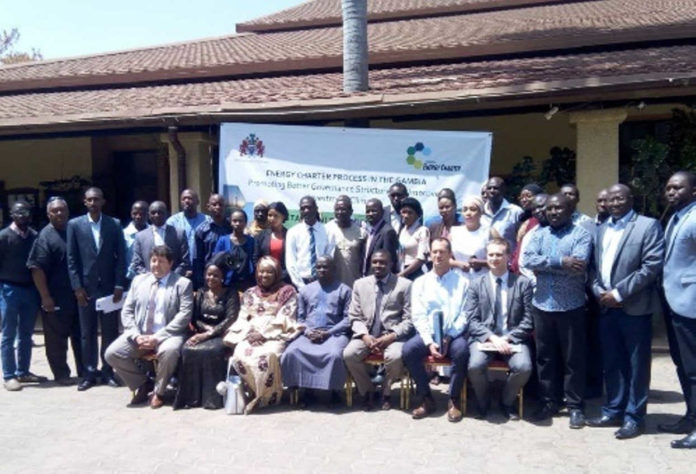By Awa Touray
The Ministry of Petroleum and Energy (MOPE) in collaboration with the Energy Charter Secretariat from Brussels, organized a stakeholders’ workshop on a global energy process called the ‘Energy Charter’.
This workshop is meant to raise awareness of key stakeholders in the energy sector, on the recent treaty signed by the Gambia called the International Energy Charter. The signing of this charter was said to mark the commitment of the Gambia towards strengthening global energy cooperation, and enhance its energy investment, in line with the principles of the Energy Charter Treaty (ECT).
The workshop which was conducted at a local hotel in Kololi on Wednesday April 24th 2019, was attended by stakeholders from various energy related institutions in the country, together with officials from Brussels.
Discussions at the workshop centered on the key pillars of the ECT such as investment, trade, transit and energy efficiency. Discussions were also held on the energy policy objectives and priorities in the Gambia.
Fafa Sanyang, the Minister of Petroleum and Energy said the Gambia adopted the International Energy Charter in August 2017, in view of the rapidly evolving global energy market, resulting to new challenges and opportunities. He said there is need for enhancement of existing policies and strategies and to align them with international best practices, ‘‘in order to attract the much-needed investments for the country;”
That it is within this context that the Gambia joined the International Energy Charter to leverage the benefits of International Energy Cooperation, in order to access International energy markets.
Dr. Marat Terterov of the Energy Charter Secretariat said the purpose of their visit to the Gambia is to provide information; that they will hopefully provide the country with capacity to better understand their organization. He said the main focus of the organization is investment and trade.
Dr. Terterov said their focus is on how energy crosses national boundaries; that the Gambia has made a political decision to join the international energy organization which he said, is important for the development of the country’s energy sector; that such type of membership in such an organization allows a country to benefit not only in line with their national energy policy objective strategies, but contributes to a country’s overall social development.
Josselin Amalfi, a representative of the EU Delegation to the Gambia, said the energy challenges faced by the Gambia, drives people to use fuel wood and charcoal, and traditional biomass for cooking fuel, linked to energy. “A key element in building a strong coalition is the recognition of energy access as a sustainable development goal; thus keeping the momentum for the next decade and a half.



















